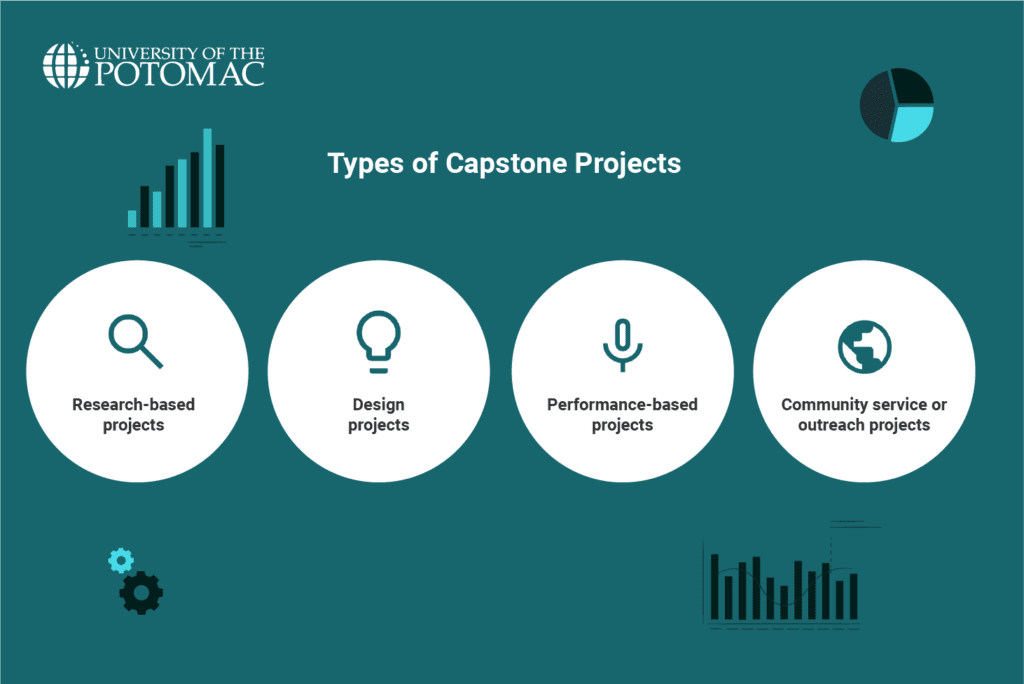What is A Capstone Project?
A capstone project is the final academic assignment for undergraduate and graduate students. For a project of this nature, students must use the knowledge they’ve gained during their studies to work on a real-world problem or topic. They usually conduct research, plan and use the skills they have developed, and showcase their work through a presentation or written report.
A capstone project has many benefits as it requires students to sum up everything they’ve learned in their field into one single project. Finishing a project like this is also a great way for students to get some hands-on experience to prepare for jobs after graduation.
Why are Capstone Projects Important?
Capstone projects are an essential component of one’s education for multiple reasons. First, a capstone project helps students apply classroom knowledge to real-world scenarios. This way, the capstone becomes the gateway from theory to practice, and as such, makes students more prepared for the job market.
Second, working on such a big project helps students fortify important skills like problem-solving, conducting research, communicating their ideas, and time management. As capstone is a time and resource-intensive project, students also learn how to plan, stay organized, and present their work clearly to others.
Last but not least, students who complete a capstone project have proven to be competent independently and without supervision. This ability is highly-sought after by employers, which is why students who have dedicated time to their capstone project manage to stand out during the application process.
Types Of Capstone Projects

Fortunately, when it comes to capstone projects, students are not limited to just one type of project. There are 4 main types of capstone —research-based, design projects, performance-based, and community service or outreach projects— which we will explain in detail below.
Research-based projects
At its core, research-based capstone projects are an in-depth exploration of a specific topic, often rooted in academic or professional fields. These projects require you to collect, analyze, and interpret data, as such, making you competent to demonstrate advanced research skills.
While all capstone projects aim to synthesize and showcase learning, research-based capstone projects stand out for their emphasis on systematic inquiry and evidence-based conclusions. So in a sense, the research-based capstone project is the closest thing to a thesis, though the thesis is broader and contributes new knowledge to a certain field or topic.
In the end, students share their findings, along with a conclusion and suggestions through a research paper, report, or presentation.
Design projects
In a more practical way than research-based capstones, design-based projects focus on creating a tangible product or solution that addresses a specific problem or need. This could include making a prototype, building a new software app, creating a marketing campaign, or designing a device.
Due to its practical application, the main goal is to bridge the gap between the theory they acquired during their education with the real-life practice they will work with in their future careers. Generally speaking, these projects help students enhance their technical skills before they enter the job market while, at the same time, developing essential skills such as creativity, critical thinking, and time management.
Performance-based projects
Going further down the practical learning, performance-based capstones require students to showcase their skills in front of an audience, either live or through a recording. The performance can either be a theatrical performance, musical recital, public speaking event, or media production.
Due to the nature of these projects, they are mostly used by disciplines like performing arts, communication, or media studies, where the focus is on mastering and presenting a craft.
The key to these types of capstones is to demonstrate:
- The skills students developed during university years
- The ability to connect and impact an audience
- The capacity to meticulously plan rehears and/or collaborate with peers
- Originality and personal style in their performance
Community service or outreach projects
Community service or outreach capstone projects focus on initiatives that aim to help a specific community or address a social issue. In essence, these projects aim to blend academic knowledge with civic engagement. For example, a capstone project can be a community event, an awareness campaign, or a local challenge solution.
As these projects encourage collaboration, empathy, and a deep understanding of societal needs, their goals are twofold: to empower students to apply their skills and knowledge to meaningful causes and to create tangible benefits for the communities they serve.
